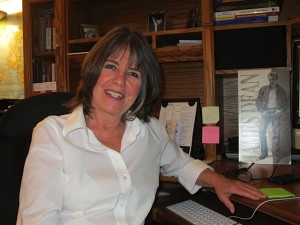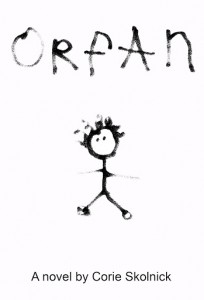Resilient Adoptees–Author Interview with Corie Skolnick (Part 1)
ORFAN? What does that mean? Can’t you spell anymore, Laura?
Okay, okay, bear with me, here. I’m deviating from my Adoption Glossary to highlight … ORFAN, the title of an amazing “existential fable” of a “quintessential resilient adoptee.” (The author’s words, but I love this description.)
Here are the notes from my interview with author, Corie Skolnick.
Laura — To start, I simply must quote you from yesterday’s Lost Daughters interview.
I have a profound admiration for “resilient” adoptees. To survive and thrive (and so many do) when burdened by mysterious and unfathomable feelings of loss and alienation and disorientation! Wow! Just wow! I don’t think it’s an overstatement to call that kind of survival miraculous.
This is why Jimmy Deane is such a magical character. A lot of the psychological qualities exhibited by adoptees are noted as negative or dysfunctional. I think it’s much better to note anything problematic as “strategic.”
Like your own flight into non-reality. Was that craziness? Psychosis? Or, was it a very creative response to overwhelming emotional, physical and even spiritual overload?
Adoptees in my experience are the ultimate adapters. And, I don’t know if I would say universally, but definitely, I would say that in numbers that are statistically notable, adoptees are gifted and artistic and intelligent. I’m still waiting to meet an adoptee that has not excelled in some art form. This is why I made Jimmy Deane a musical prodigy and such a creative survivor, in every sense. He’s the quintessential resilient adoptee.
The Resilient Adoptee–wallowing, suppressing or healing?
Laura – Your comments about my memoir had me rethinking my own breakdown. On the other hand, shouldn’t we adoptees just “get over it already” and put the past in the past?
Corie – I know, you hear that opinion expressed a lot, and I’m sorry. I guess, in one sense, we would all be better off if we could “get over it already” whatever our “it” is. But, it doesn’t work that way. I mean, could you?
Is it still “trauma” if it happened at birth?
 Corie – Short of a complete eradication of memory, we are all stuck with carrying our past (and especially our past trauma, maybe) around with us. Because we DO remember, even when memory is repressed or suppressed. Memory is still an active agent in our emotional, mental and even physical experience.
Corie – Short of a complete eradication of memory, we are all stuck with carrying our past (and especially our past trauma, maybe) around with us. Because we DO remember, even when memory is repressed or suppressed. Memory is still an active agent in our emotional, mental and even physical experience.
It’s also a popular notion that if the “it” you should get over happened to you young enough, you shouldn’t even have trauma. The, “Oh, you were so young when you were adopted! You couldn’t possibly even remember being given up by your birth mother!” rationale.
Brain science has come a long way in the last two decades to inform us about sensory memory and also about how early trauma impacts development. From my point of view, the pressure that adoptees get (others, too) to “get over it, already” is all too often coming from sources that have a need for the adoptee to be “fine.”(“Fine. Fine. I’m fine!”) I don’t usually quote Dr. Phil, but, “How’s that workin’ for ya’?” is a great question for people who have been pressured to deny their own feelings and experiences.
One of the reasons I wrote ORFAN, and made an adoptee my central “hero” character was that I came to understand working clinically that there is no greater human trauma than the separation of the newborn infant from its birth mother.
That’s not to say that I believe that all relinquished infants are hopelessly screwed up. Not at all. In fact there’s some evidence to suggest that the earlier the trauma to the brain, the MORE adaptation and compensation will occur, hence “resilience” at a physiological level even. But, every adult adoptee I’ve ever worked with in therapy reported a very early felt sense that something was “wrong”, or “missing”, or “off” even when they could not articulate those feelings. When the child’s whole world is populated by people who deny that felt sense, and in turn demand that the adoptee deny it, well it sets them up to play fast and loose with reality, don’t you think?
Likewise, most adoptees express enormous relief when their memories and feelings are reflected back accurately and they are really “heard.”
* * * * *
Final notes from Laura – Helloooo calling all Ghost Kingdom members! Adoptee resilience, adapting, living too long with What Ifs? It’s all symbolically there in Skolnick’s ORFAN. Take a look at my Amazon review, and do buy her book!
Be sure to check out Part II of my interview with Corie on Friday, here at Expat Adoptee Mommy.
One person who comments below will be chosen to receive a free ebook copy of ORFAN. Please share your thoughts!
Images courtesy of Corie Skolnick and Mannequin Vanity Publishing.





Resilience is such an important – for everyone.
Oops.
Resilience is such an important quality – for everyone.
This is particularly profound to me: "most adoptees express enormous relief when their memories and feelings are reflected back accurately and they are really “heard.”
Can't wait to read this!
My 4 kids are adopted. I often wonder about their birth mothers and what their stories are. I also wonder how much therapy they're in for. And then how much of that is that they have me for a mom and how much is residual? And does it even matter?
Great perspectives.
This is a really interesting post. I wasn't adopted, but my birth mother left when I was 8 and I grew up with my dad and stepmom who is the most amazing woman in the world.
Very cool, I think some of those "adoptee feelings" may resonate with you. Just things like, wondering why she left–if you know the reasons, were those the real reasons? Things like that. I had an adoption narrative that I was given as a child, but once I reunited with my first mother, I understood it was a lot more complicated. Thanks for commenting!
Great perspective indeed. That said, I am not sure that all adoptees react the same way. What makes some resilient and others, well, less so? I sometimes wonder.
That's a good point, adoptees do react differently. And definitely, resiliency can be a type of coping mechanism, one that others develop more thoroughly than others.
MuMuGB,
"What makes some resilient and others, well, less so? I sometimes wonder."
If any of us could answer that question we'd be very famous indeed. The search for the "magic" of resiliency has a long and storied research history. As far as I know, nobody has completely solved the mystery. Although some commonalities have been found among what Psychology calls now, "the self-healing personality". (Not only in terms of adoptees, of course.)
Yours is a very good question! I wish I had an answer. I only know that it isn't a simple one.
This reminds me of my close friend who does her absolute best to try to understand, which is sometimes enough for me. She asked me 'why are you so incredibly afraid of rejection? After all, you have climbed the Everest of rejection, you are clearly made of tough stuff'. I loved her point but I don't think it works that way! Yes, we are resilient, we adapted back then, to the extent of denying our true selves. I love that someone can say Wow about what and how we have survived, it is so so different to the usual responses. Thank you. I look forward to reading your book Corie.
Thanks, Joanne. Let me know your thoughts and reactions, please. There's a link to my gmail address on the website http://www.corieskolnick.com I look forward to hearing from you.
Hello, after reading this remarkable article i am too delighted to share my know-how here with

mates.
Clarita recently posted..Clarita
Clarita recently posted..Clarita